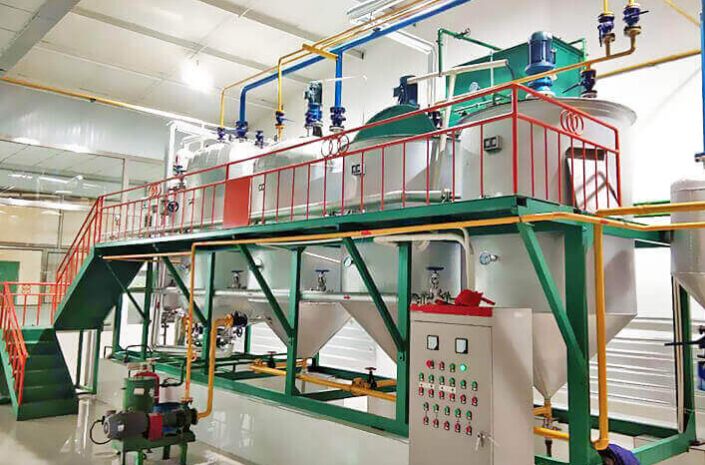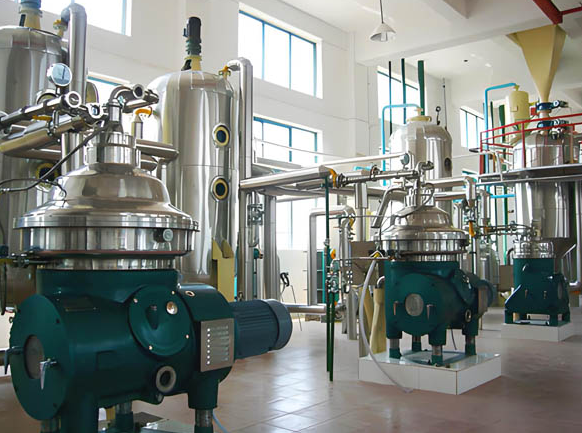China leading palm oil mill plant machine manufacturer and supplier
Email:info01@cnoilmachine.com
The cost of establishing a palm oil refinery varies significantly due to multiple factors, including plant size, location, equipment selection, and compliance certifications. Investments can range from hundreds of thousands to hundreds of millions of yuan, from small workshops to large-scale modern industrial bases. The following breakdown of costs is based on different scales and real-world examples: Small Palm Oil Refinery These plants typically have a daily processing capacity of 5-10 tons, suitable for individual operators or small cooperatives, primarily catering to small-scale regional processing needs. Costs are relatively low, with overall investment typically ranging from several hundred thousand to two million yuan. The specific components are as follows: Equipment Costs: Core equipment consists mainly of basic refining equipment, including small presses, filters, and simple degumming and deacidification devices. A single small screw press costs approximately 14,000-21,000 yuan. A complete 5-10 ton/day refining system, including basic motors and processing components, has a total equipment investment of approximately 140,000-210,000 yuan. Choosing secondhand equipment can further reduce costs by 30%-40%, but additional maintenance expenses must be budgeted.
Basic Support Costs: No large-scale land purchase is necessary; leasing a small suburban factory is sufficient. For example, a 500㎡ factory typically incurs tens of thousands of yuan in annual rent. Simple factory renovation and water/electricity supply construction cost approximately 100,000-200,000 yuan. Adding basic quality control instruments and small storage facilities, this portion of the investment is roughly 200,000-500,000 yuan.

Other Costs: These include business registration and basic food production permits, approximately 10,000-50,000 yuan. Initially, only 5-10 people are needed, with first-month wages and social security expenses around 30,000-80,000 yuan. Overall, initial non-productive expenses are relatively low.
Medium-Sized Palm Oil Refinery: A medium-sized refinery has a daily processing capacity of 50-100 tons, possessing large-scale production capabilities. Products can supply the regional market, and some can be supplied to small food processing enterprises. Investment typically ranges from several million to tens of millions of yuan. The specific costs are as follows:
Equipment Costs:A complete automated refining production line is required, encompassing equipment for degumming, deacidification, decolorization, and deodorization processes, along with a PLC-based control system.
Infrastructure and Land Costs: Land acquisition is calculated based on 50 mu (approximately 3.3 hectares). If located in a raw material-rich area, the land cost is approximately 100,000 yuan per mu, resulting in a total land expenditure of approximately 5 million yuan. Construction of standardized factory buildings and supporting warehousing and wastewater treatment facilities, based on the cost per cubic meter of concrete structure, will require an infrastructure investment of approximately 5-8 million yuan.

Compliance and Operational Preparation Costs: Expenses include environmental impact assessment, initial raw material stockpiling, and employee training (approximately 50-100 people), plus energy consumption costs for the first month, totaling approximately 1-2 million yuan. Large-scale palm oil refineries
These plants can process hundreds of tons per day, possessing full refining, fractionation, and large-scale packaging capabilities. They are typically modern industrial bases, often equipped with distribution centers, and investments usually reach tens or even hundreds of millions of RMB. Typical examples and cost breakdowns are as follows:Mega-scale project cost reference: For a planned large-scale project with an annual processing capacity of 1 million tons, costs will increase significantly. Land acquisition alone, if 1000 mu (approximately 67 hectares) is required, at 100,000 RMB per mu, would cost 100 million RMB; infrastructure construction (including high-standard wastewater treatment, dedicated transportation channels, etc.) would cost approximately 50 million RMB; the introduction of internationally advanced automated refining equipment and control systems would cost approximately 100 million RMB, plus initial labor costs for 200 employees, equipment maintenance reserves, etc., bringing the initial fixed investment alone to nearly 300 million RMB.
Additional hidden and fluctuating costs: In addition to the direct costs mentioned above, two other types of expenses require close consideration. First, there are energy and environmental costs. The deodorization process in palm oil refining is energy-intensive, and large factories need to be equipped with efficient wastewater treatment systems, such as MBR membrane bioreactor technology and equipment. Second, there are raw material and logistics fluctuation costs. Palm oil raw materials rely on imports or cross-regional transportation. Fluctuations in international futures prices will affect the initial stocking costs, and the investment in warehousing and transportation facilities will also be adjusted according to market demand.
If you are interested in our palm oil machine and palm oil mill plant. You can contact us through online consultation, filling out the form below, email, phone, etc. Our engineers will customize the most suitable plan and best price for you.